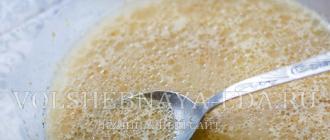Nikolai Vasilievich Gogol
Evenings on a farm near Dikanka
PART ONE
PREFACE
“What kind of unprecedented thing is this: “Evenings on a farm near Dikanka?” What are these “Evenings”? And some beekeeper threw it into the light! God bless! They haven’t yet stripped the geese of their feathers and turned their rags into paper! There are still a few people, of all ranks and rabble, who have their fingers dirty in ink! The hunt also prompted the beekeeper to drag along after the others! Really, there is so much printed paper that you can’t quickly think of anything to wrap it in.”
I heard, my prophetic heard all these speeches for another month! That is, I say that our brother, the farmer, should stick his nose out of his remote place into the big world - my fathers! It’s the same as what happens sometimes when you go into the chambers of a great master: everyone surrounds you and starts to fool you. It would be nothing, let it be the highest lackey, no, some ragged boy, look - rubbish, who is digging in the back yard, and he will pester; and they will start stamping their feet from all sides. “Where, where, why? let's go, man, let's go!.." I'll tell you... But what can I say! It’s easier for me to go twice a year to Mirgorod, where neither the judge from the zemstvo court nor the venerable priest has seen me for five years, than to appear on this great light. But it seemed - don’t cry, give me an answer.
Here, my dear readers, don’t say this in anger (you may be angry that the beekeeper speaks to you simply, as if to some matchmaker or godfather), - here on our farms it has long been the custom: as soon as work in the field will end, the man will climb up to rest on the stove for the whole winter, and our brother will hide his bees in a dark cellar, when you will no longer see cranes in the sky or pears on the tree - then, just evening, probably somewhere in the end the streets are lit up, laughter and songs are heard from afar, the balalaika is strumming, and sometimes the violin, talking, noise... This is ours evening parties! They are, if you please, similar to your balls; I just can’t say that at all. If you go to balls, it is precisely to twirl your legs and yawn in your hand; and in our house a crowd of girls will gather in one hut, not at all for a ball, with a spindle, with combs; and at first they seem to be busy: the spindles are noisy, songs are flowing, and each one does not even raise an eye to the side; but as soon as the couples with the violinist come into the hut, a scream will rise, a shawl will start, dancing will begin and such things will happen that it is impossible to tell.
But it’s best when everyone huddles together in a tight group and starts asking riddles or just chatting. My God! What they won’t tell you! Where antiquities won't be dug up! What fears will not be caused! But nowhere, perhaps, were so many wonders told as at the evenings at the beekeeper Rudy Panka’s. Why the laity called me Rudy Pank - by God, I don’t know how to say. And it seems that my hair is now more gray than red. But we, if you please, do not get angry, have this custom: when people give someone a nickname, it will remain forever and ever. It used to be that they would get together the day before holiday good people will visit Pasichnikov’s shack, sit down at the table, and then I ask you to just listen. And that is to say that the people were not at all just a dozen, not some peasant peasants. Yes, maybe someone else, even higher than the beekeeper, would have been honored by a visit. For example, do you know the clerk of the Dikan church, Foma Grigorievich? Eh, head! What kind of stories he could tell! You will find two of them in this book. He never wore a motley robe, such as you will see on many village sextons; but come to him on weekdays, he will always receive you in a thin cloth robe the color of chilled potato jelly, for which in Poltava he paid almost six rubles per arshin. From his boots, no one in our whole village can say that the smell of tar can be heard; but everyone knows that he cleaned them with the best lard, which, I think, some man would happily put in his porridge. No one will also say that he ever wiped his nose with the hem of his robe, as other people of his rank do; but he took out from his bosom a neatly folded white handkerchief, embroidered along all the edges with red thread, and, having corrected what needed to be done, folded it again, as usual, into a twelfth share and hid it in his bosom. And one of the guests... Well, he was already so panicked that he could at least now dress up as an assessor or subcommittee. Sometimes he would put his finger in front of him and, looking at the end of it, would begin to tell a story - pretentiously and cunningly, like in printed books! Sometimes you listen and listen, and then thoughts come over you. For the life of me, you don’t understand anything. Where did he get those words from! Foma Grigorievich once wove him a nice tale about this: he told him how one schoolboy, learning to read and write from some clerk, came to his father and became such a Latin scholar that he even forgot our Orthodox language. All words are twisted. His shovel is a spade, his woman is a babus. Well, one day it happened, they went with their father to the field. Latynytsik saw the rake and asked his father: “What do you think this is called, dad?” Yes, and with his mouth open, he stepped on the teeth. He didn’t have time to compose himself with an answer when the hand, swinging, rose and grabbed him on the forehead. “Damn rake! - the schoolboy shouted, grabbing his forehead with his hand and jumping an arshin. “How can they, the devil push their father off the bridge, fight painfully!” So that's how it is! I also remembered the name, my dear! The intricate storyteller did not like such a saying. Without saying a word, he stood up, spread his legs in the middle of the room, bent his head a little forward, put his hand in the back pocket of his pea caftan, pulled out a round, varnished snuff-box, snapped his finger on the painted face of some Busurman general, and, taking a considerable a portion of tobacco, ground with ash and lovage leaves, brought it to his nose with a yoke and pulled out the whole pile with his nose on the fly, without even touching thumb, - and still not a word; Yes, when I reached into another pocket and took out a blue checkered paper handkerchief, then I just muttered to myself almost a proverb: “Don’t throw pearls before swine”... “Now there will be a quarrel,” I thought, noticing that Foma’s fingers Grigoryevich was just about to get hit. Fortunately, my old woman thought of putting a hot knish with butter on the table. Everyone got down to business. Foma Grigorievich's hand, instead of showing the shish, reached out to the knysh, and, as always, they began to praise the craftswoman and hostess. We also had one storyteller; but he (there would be no need to remember about him by nightfall) dug up such scary stories that the hair was running all over my head. I didn't put them here on purpose. You'll scare me more good people so that, God forgive me, everyone will be afraid of the devil. It’s better that when I live, God willing, until the new year and publish another book, then it will be possible to fear people from the other world and the divas that happened in the old days in our Orthodox side. Among them, perhaps, you will find the fables of the beekeeper himself, which he told to his grandchildren. If only they listened and read, but I, perhaps, - I’m just too damn lazy to rummage around - can get enough of ten such books.
Yes, that was it, and I forgot the most important thing: when you, gentlemen, come to me, then take the straight path along the main road to Dikanka. I deliberately put it on the first sheet of paper so that they could get to our farm faster. I think you’ve heard enough about Dikanka. And that’s to say that the house there is cleaner than some pasichnikov’s kuren. And there’s nothing to say about the garden: you probably won’t find anything like this in your St. Petersburg. Having arrived in Dikanka, just ask the first boy you come across, herding geese in a soiled shirt: “Where does the beekeeper Rudy Panko live?” - “And there!” - he will say, pointing his finger, and, if you want, he will take you to the very farm. I ask, however, not to put your hands back too much and, as they say, to feint, because the roads through our farmsteads are not as smooth as in front of your mansions. In his third year, Foma Grigorievich, coming from Dikanka, came to the hole with his new tarataika and a bay mare, despite the fact that he himself was driving and that from time to time he wore store-bought ones over his eyes.
But as soon as you welcome us, we will serve you melons such as you may not have eaten in your life; But for honey, and I’ll swear by it, you won’t find anything better on the farmsteads. Imagine that as soon as you bring in the honeycomb, the spirit will go throughout the room, it’s impossible to imagine what kind: pure, like a tear or expensive crystal, which happens in earrings. And what kind of pies will my old woman feed me! What kind of pies are these, if only you knew: sugar, perfect sugar! And the oil just flows over your lips when you start eating. Just think, really: what masters are these women! Have you ever, gentlemen, drank pear kvass with sloe berries or varenukha with raisins and plums? Or have you ever eaten putra with milk? My God, what kind of dishes are there in the world! If you start eating, you’ll be full and full. The sweetness is indescribable! Last year... However, why did I really blab?... Just come, come quickly; and we’ll feed you in such a way that you’ll tell everyone you meet and those who cross you.
Evenings on a farm near Dikanka . This is a real classic! Nikolai Gogol
(No ratings yet)
 Title: Evenings on a farm near Dikanka
Title: Evenings on a farm near Dikanka
About the book “Evenings on a farm near Dikanka” Nikolai Gogol
The world of imagination is truly limitless. You are convinced of this by reading books such as “Evenings on a Farm near Dikanka” by Nikolai Gogol. The mysticism, in some stories on par with modern horror films, is truly frightening. And yet - how well written! Once you start reading, it is simply impossible to stop. It’s not for nothing that “Evenings on a Farm near Dikanka” was included in. We also recommend everyone to read it!
And you can download the book itself at the bottom of the page in rtf, epub, fb2, txt format.
I was most impressed by the story “The Night Before Christmas” (I think many of you reread it recently, during the holidays). It reveals not only the customs themselves, but also their colorful atmosphere; here there is creaking snow that excites the imagination, and fragrant palyanytsi with sausage, and exciting carols.
Nature in Gogol’s description is something. The selected metaphors and epithets are striking in their freshness. What is the Ukrainian night alone worth... And the Dnieper, and the steppe, and the wind, and all this sounds like a song. Reading the descriptions of all sorts of goodies and trash, dumplings and donuts, you can feel their seductive smell!
And the heroes! One is more beautiful than the other. Capricious Oksana, Solokha, Solopiy... Their characters are unusually bright, and each is revealed in a unique, unusual situation in a laconic story. There is something comical in all of them; they are amusing in their simplicity. Grumpy wives with their spineless husbands in some stories contrast sharply with the Cossacks and their noble wives in others.
Would it be Gogol if he had not seasoned his stories with a hefty dose of mysticism? Of course, “Evenings on a Farm near Dikanka” is not “Viy”, but still... Its mysticism is organically woven into Ukrainian life, complementing it and making it even more colorful. And if in some stories you can laugh at all this evil, then in others (for example, “Terrible Revenge”, “The Night on the Eve of Ivan Kupala”) sometimes it becomes really creepy.
Probably, such vivid stories were once listened to by Chumaks who stopped for the night. We sat around the fire and listened to incredible stories under the crackling fire. And all around is the steppe, and the black sky, and the quiet stars, and the sound of the wind. I wonder if Gogol was told these stories? After all, you have to come up with such things yourself!
It’s not for nothing that Gogol is considered a classic. Incredibly rich language, vivid characters, wonderful descriptions of nature and people, as well as excellent humor and real mysticism - this is truly his talent. I would really like “Evenings on a Farm near Dikanka” to be read by everyone who hasn’t read it yet :)
On our website about books you can download the site for free or read online book“Evenings on a farm near Dikanka” Nikolai Gogol in epub, fb2, txt, rtf, pdf formats for iPad, iPhone, Android and Kindle. The book will give you a lot pleasant moments and a real pleasure to read. Buy full version you can from our partner. Also, here you will find latest news from the literary world, learn the biography of your favorite authors. For beginning writers there is a separate section with useful tips and recommendations, interesting articles, thanks to which you yourself can try your hand at literary crafts.
Quotes from the book “Evenings on a Farm near Dikanka” Nikolai Gogol
Really, there is so much printed paper that you can’t quickly think of anything to wrap it in.
Lord my God, why such an attack on us sinners! And there’s so much crap in the world, and you’ve also given birth to little women!
It’s easier for a woman to kiss the devil than to call someone beautiful...
When a person is silent, he has certainly lost a lot of his mind.
Wonderfully arranged in our world! Everything that lives in him is trying to adopt and imitate one another!
For myself, I am ready to divide Gogol’s work into two blocks: Russian (“Dead Souls”, “Petersburg Tales”) and Ukrainian (“Evenings on a farm near Dikanka”, “Taras Bulba”).
And if I really like the first one, then I absolutely do not like the second one.As the book description says:
The satirical cycle “Evenings on a Farm near Dikanka” became Gogol’s ardent declaration of love for Ukraine
What's true is true: there is an infinite amount of Ukrainian life here. Alas, too much for me. Here are two heroes sitting and spending the entire page discussing progressive German methods of steam smoking and the possibility of setting up a new distillery. Everyday life, everyday life, everyday life. Or they remember their relatives and friends, with whom no one plans to introduce the reader, but it is necessary to tell how they are doing. Let me remind you that the stories are short and do not exceed 30 text pages. “Taras Bulba” sinned in the same way: once the Cossacks begin to wash each other’s bones during the battle, there is no end.
On the other side, I like the description of nature: very bright and colorful passages, simply fascinating. They create an atmosphere much better than endless conversations about nothing.
Do you know Ukrainian night? Oh, you don’t know Ukrainian night! Look closely at it: the moon is looking down from the middle of the sky. The vast vault of heaven opened up and spread even more vastly. It burns and breathes. The earth is all in a silver light; and the wonderful air is cool and sultry, and full of bliss, and moves with an ocean of fragrances. Divine night! Charming night!..
And now you already imagine yourself under the deep black sky. Or:
It shines quietly all over the world: then the moon appeared from behind the mountain. It was as if he had covered the mountainous bank of the Dnieper with a damask road and white as snow muslin, and the shadow went even further into the thicket of pine trees.
Well, how can you not be transported to the coast of this beautiful river?
The Dnieper is wonderful in calm weather, when its full waters freely and smoothly rush through forests and mountains. Not a stir; it won't thunder. You look and don’t know whether its majestic width goes or doesn’t go, and it seems as if it is all cast from glass, and as if a blue mirror road, immeasurably wide, endlessly long, soars and winds through the green world.
A separate problem for me was outdated spelling of many words. For example, “Cossack” or “devil”. I realize that this was done purposefully to emphasize the Ukrainian vernacular and local flavor, to convey the atmosphere of a small village with a motley superstitious public. But it doesn't get any easier.
The moral of all stories lies on the surface. There are no tragic dilemmas here and there is simply nothing to discuss in a heated argument on long winter evenings, trying to find who is right and wrong or to justify the heroes. No, “Evenings on a Farm near Dikanka” is a collection of very simple stories, where good always triumphs and love always wins. The only thing that can be discussed after reading is how much social mores have changed or remained the same over two centuries.
Genre:
Description of the book: One day an old manuscript was bought at the market. After reading it, it remains large number questions without answers. In this book, the main characters are two friends, represented by a blacksmith and a high school student. In this book, readers will be able to find out the answers to a variety of questions, including how to pacify raging mermaids or whether it is easy to run through the inferno and back. The book also presents other questions, to which the author gives fairly detailed answers, describing the fantastic adventures of two best friends. Go with them.
In these times of active fight against piracy, most of the books in our library have only short fragments for reference, including the book Night on a Farm near Dikanka. Thanks to this, you can understand whether you like this book and whether you should purchase it in the future. Thus, you support the work of the writer Andrei Belyanin by legally purchasing the book if you liked its summary.






